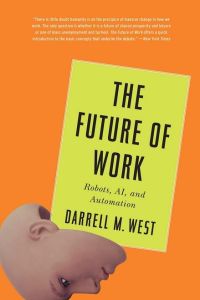Rejoignez getAbstract pour lire le résumé !

Rejoignez getAbstract pour lire le résumé !
Darrell M. West
The Future of Work
Robots, AI, and Automation
Brookings Institution Press, 2019
Aperçu
Rapid technological change could revolutionize economic policy for the better or for the worse.
Recommendation
Darrell M. West – director of the Center for Technology Innovation at the Brookings Institution – offers a succinct review of current trends, forecasts a future in which fewer people will work and explores the impact on society. Business, transportation and medicine are already using robotics, AI and the Internet of Things to redefine work and finance, obsoleting many of today’s jobs. Revising the social safety net requires innovation to protect workers’ economic security in uncertain times.
Summary
About the Author
Darrell M. West is the director of the Center for Technology Innovation at the Brookings Institution and editor in chief of the Brookings tech policy blog TechTank. He has authored or co-authored 24 books including Divided Politics, Divided Nation; Megachange and Going Mobile.


























Comment on this summary